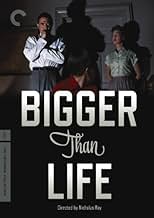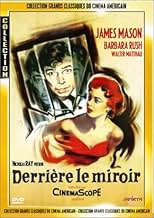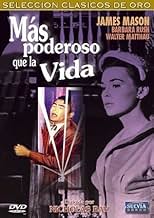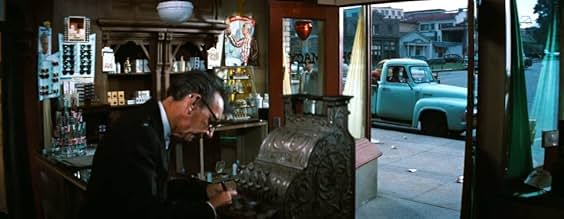CALIFICACIÓN DE IMDb
7.4/10
8.6 k
TU CALIFICACIÓN
Un profesor de escuela gravemente enfermo se vuelve dependiente de una droga milagrosa que empieza a afectar a su cordura.Un profesor de escuela gravemente enfermo se vuelve dependiente de una droga milagrosa que empieza a afectar a su cordura.Un profesor de escuela gravemente enfermo se vuelve dependiente de una droga milagrosa que empieza a afectar a su cordura.
- Dirección
- Guionistas
- Elenco
- Premios
- 2 nominaciones en total
Robert F. Simon
- Dr. Norton
- (as Robert Simon)
David Bedell
- X-Ray Doctor
- (sin créditos)
Gail Bonney
- Mother at PTA Meeting
- (sin créditos)
Harold Bostwick
- Gentleman
- (sin créditos)
Lovyss Bradley
- Churchgoer
- (sin créditos)
Mary Carroll
- Mother at PTA Meeting
- (sin créditos)
Virginia Carroll
- Mrs. Jones
- (sin créditos)
Mary Carver
- Saleslady
- (sin créditos)
Betty Caulfield
- Mrs. LaPorte
- (sin créditos)
Opiniones destacadas
"We are dabbling in the unknown with dangerously potent tools." That is from the magazine article on which this film is based: "Ten Feet Tall," by Berton Roueché, from his brilliant "Annals of Medicine" series in The New Yorker (10 September 1955). Before I watched this Nicholas Ray film for the 2nd time, I read the original article and was quite astonished to find that the film is both faithful and unfaithful to the truth, and in surprising ways.
The most stunning thing is how quickly Ed (James Mason) is affected by the cortisone he is given to treat his rare and dire disease, a typically fatal inflammation of the arteries. I doubted that the derangement that made him feel "ten feet tall" would have happened as quickly as in the movie, which needs to get the plot going.
Well, I was wrong. The Long Island teacher on whom the article was based had a psychotic break almost as soon as he started taking the corticosteroid. The entire episode of his psychosis lasted only three weeks, but during that time, he was a terrifying presence. His threatening, dictatorial behavior toward his wife and son, not to mention his colleagues, were, yes, exaggerated for dramatic effect (especially the scorn he heaps on his wife), but Mason's portrayal is strikingly close to the real teacher's experience: the madly impulsive spending, the manic speeches and wild philosophical brainstorms, as well as his demand to be absolute ruler in his home and his unveiled contempt for everyone because they're all fools, except him.
James Mason, Barbara Rush, and Walter Matthau do solid work, as does Christopher Olsen, a child actor who also worked with Hitchcock, Cukor, and Sirk. Much has been said about Nicholas Ray's choices as director, and what interests me most is the ways he chose to be unfaithful to the original story.
First, location. Although the actual teacher lived in Forest Hills in Queens, "Bigger than Life" is set in a nameless suburbia, and it was filmed it in color for the big screen even though it's a domestic drama of the sort that was still shot in black-and-white at the time. Much has been made of those two choices, which are taken to be a commentary on stifling, conformist suburban lives in the 1950s. But I think Ray's decision to move it to a more typical American landscape than New York City, and to treat it as a big-screen color feature, had to do with the dramatic weight of the subject: drugs that save lives can cripple them at the same time, and the film has strong references to the deep shame that was (and to some extent still is) attached to mental illness. The wife won't even hear the word psychiatrist.
Second, the doctors. In the movie, Ed tricks doctors and druggists to increase his intake of cortisone-- if he feels ten feet tall on one pill, why not take two? In the true story, it was the doctor who increased the dosage, but did not schedule frequent follow-ups, even though he knew the risks from side effects. That's a much more damning situation than a mentally ill outpatient doubling his own dosage. So why shift the blame from doctor to patient in the movie? Here's a possibility: There was concern about blowback from pharmaceutical companies and/or the American Medical Association. But on the whole, I can see why "Bigger Than Life" has come to be so highly regarded, if not sufficiently well known.
The most stunning thing is how quickly Ed (James Mason) is affected by the cortisone he is given to treat his rare and dire disease, a typically fatal inflammation of the arteries. I doubted that the derangement that made him feel "ten feet tall" would have happened as quickly as in the movie, which needs to get the plot going.
Well, I was wrong. The Long Island teacher on whom the article was based had a psychotic break almost as soon as he started taking the corticosteroid. The entire episode of his psychosis lasted only three weeks, but during that time, he was a terrifying presence. His threatening, dictatorial behavior toward his wife and son, not to mention his colleagues, were, yes, exaggerated for dramatic effect (especially the scorn he heaps on his wife), but Mason's portrayal is strikingly close to the real teacher's experience: the madly impulsive spending, the manic speeches and wild philosophical brainstorms, as well as his demand to be absolute ruler in his home and his unveiled contempt for everyone because they're all fools, except him.
James Mason, Barbara Rush, and Walter Matthau do solid work, as does Christopher Olsen, a child actor who also worked with Hitchcock, Cukor, and Sirk. Much has been said about Nicholas Ray's choices as director, and what interests me most is the ways he chose to be unfaithful to the original story.
First, location. Although the actual teacher lived in Forest Hills in Queens, "Bigger than Life" is set in a nameless suburbia, and it was filmed it in color for the big screen even though it's a domestic drama of the sort that was still shot in black-and-white at the time. Much has been made of those two choices, which are taken to be a commentary on stifling, conformist suburban lives in the 1950s. But I think Ray's decision to move it to a more typical American landscape than New York City, and to treat it as a big-screen color feature, had to do with the dramatic weight of the subject: drugs that save lives can cripple them at the same time, and the film has strong references to the deep shame that was (and to some extent still is) attached to mental illness. The wife won't even hear the word psychiatrist.
Second, the doctors. In the movie, Ed tricks doctors and druggists to increase his intake of cortisone-- if he feels ten feet tall on one pill, why not take two? In the true story, it was the doctor who increased the dosage, but did not schedule frequent follow-ups, even though he knew the risks from side effects. That's a much more damning situation than a mentally ill outpatient doubling his own dosage. So why shift the blame from doctor to patient in the movie? Here's a possibility: There was concern about blowback from pharmaceutical companies and/or the American Medical Association. But on the whole, I can see why "Bigger Than Life" has come to be so highly regarded, if not sufficiently well known.
Bigger than Life (1956)
Tightly made, vividly acted film about a contemporary crisis--the use and abuse of a new "miracle" drug. Watching James Mason suffer, and then make other people suffer, and then face the final bells of his life, is half the movie. He's such a uniquely subtle and powerful actor (at the same time), always filled with poise and a whiff of kindly diffidence.
In a way, this is a precursor to the recent movie idea in "Limitless," where a drug makes you "bigger than life," though this is no fantasy. The drug here is cortisone, ingested orally. It had been understood as a natural (adrenal gland) steroid hormone and was manufactured (by Merck) and on the market by around 1950. And by 1956 when this movie came out it was considered a new kind of penicillin, but rather than just be an antibiotic, it seemed to just make you stronger against all kinds of ailments, especially those that involved swelling of some kind.
Director Nicholas Ray does his usual wonders with interpersonal drama and makes this quite believable, as well as dramatic, and Joe MacDonald does his usual wonders with the camera-work. The writing, too, is crisp and believable (both Ray and Mason helped with the screenplay). In all, it's a top shelf production and a great story.
But it fails somehow to be a great film, and I think the main reason is the hook to the plot, about the wonder drug, is a little too neatly packaged, with a few scenes that are almost like public service announcements. We sort of know before we are "supposed" to know that it's going to go bad--the clues go beyond foreshadowing--and so when we find out we are right, the edge is off of the narrative. Only the very end is left hanging, though you figure, with Merck keeping an eye on things, that events really can't go too wrong. According to Wikipedia, the American response at the time was shock and the movie did poorly (I guess because it looked like an attack on the nuclear family, such was the 1950s).
But the critics loved it then and like it now. A movie this well made is still a thrill to watch for all the small things--Walter Matthau in a caricatured side role as the good Uncle, the psychological effects as manifest in Mason, and even the glimpse into the attitude toward medicine at the time. I don't think it's a typical reaction to cortisone, however (from what I've read)--this is a particular case where some inherent manic-depression is triggered, and exaggerated. It would be interesting to see this re-calibrated and filmed again in modern times, but with the subtlety here, the destruction of an ordinary family without shameless excess.
Tightly made, vividly acted film about a contemporary crisis--the use and abuse of a new "miracle" drug. Watching James Mason suffer, and then make other people suffer, and then face the final bells of his life, is half the movie. He's such a uniquely subtle and powerful actor (at the same time), always filled with poise and a whiff of kindly diffidence.
In a way, this is a precursor to the recent movie idea in "Limitless," where a drug makes you "bigger than life," though this is no fantasy. The drug here is cortisone, ingested orally. It had been understood as a natural (adrenal gland) steroid hormone and was manufactured (by Merck) and on the market by around 1950. And by 1956 when this movie came out it was considered a new kind of penicillin, but rather than just be an antibiotic, it seemed to just make you stronger against all kinds of ailments, especially those that involved swelling of some kind.
Director Nicholas Ray does his usual wonders with interpersonal drama and makes this quite believable, as well as dramatic, and Joe MacDonald does his usual wonders with the camera-work. The writing, too, is crisp and believable (both Ray and Mason helped with the screenplay). In all, it's a top shelf production and a great story.
But it fails somehow to be a great film, and I think the main reason is the hook to the plot, about the wonder drug, is a little too neatly packaged, with a few scenes that are almost like public service announcements. We sort of know before we are "supposed" to know that it's going to go bad--the clues go beyond foreshadowing--and so when we find out we are right, the edge is off of the narrative. Only the very end is left hanging, though you figure, with Merck keeping an eye on things, that events really can't go too wrong. According to Wikipedia, the American response at the time was shock and the movie did poorly (I guess because it looked like an attack on the nuclear family, such was the 1950s).
But the critics loved it then and like it now. A movie this well made is still a thrill to watch for all the small things--Walter Matthau in a caricatured side role as the good Uncle, the psychological effects as manifest in Mason, and even the glimpse into the attitude toward medicine at the time. I don't think it's a typical reaction to cortisone, however (from what I've read)--this is a particular case where some inherent manic-depression is triggered, and exaggerated. It would be interesting to see this re-calibrated and filmed again in modern times, but with the subtlety here, the destruction of an ordinary family without shameless excess.
This is an excellent movie. I saw it once, and I never wish to see it again. I grew up in a household like this, only there was never a solution to my father's mania, depression, and incredible anger.
About all I can say about Mr Mason's performance, and that of Ms Rush, is that they could have been my parents, and I could have been that kid. It never got to the point where I was offered up like Isaac, but the rest of it was right, right down to the speech where the father condemns all children because they're ignorant. I'd heard that one. His wife was helpless; they all are.
I do not know where the screenwriters got their dialog, but I hope they didn't learn it the way I did. As it happened, I was terrified and transfixed while watching it, only calming down after the father realized that something was wrong, and vowed to correct it, and there was a means of correcting it.
When the movie was over--I don't know if I watched it in the theater or on TV--I had to go home, where there was still rage, and no solution to it. I would have been nine years old.
There was a time that I wanted my parents to see that movie, in the hope that they'd realize that this was how they acted, and stop it.
It never happened. They were divorced years later. My father was angry and crazy right up to the day he died three years ago. My mother, in her nursing home in Cleveland, maintains that I must be making it all up.
M Kinsler
About all I can say about Mr Mason's performance, and that of Ms Rush, is that they could have been my parents, and I could have been that kid. It never got to the point where I was offered up like Isaac, but the rest of it was right, right down to the speech where the father condemns all children because they're ignorant. I'd heard that one. His wife was helpless; they all are.
I do not know where the screenwriters got their dialog, but I hope they didn't learn it the way I did. As it happened, I was terrified and transfixed while watching it, only calming down after the father realized that something was wrong, and vowed to correct it, and there was a means of correcting it.
When the movie was over--I don't know if I watched it in the theater or on TV--I had to go home, where there was still rage, and no solution to it. I would have been nine years old.
There was a time that I wanted my parents to see that movie, in the hope that they'd realize that this was how they acted, and stop it.
It never happened. They were divorced years later. My father was angry and crazy right up to the day he died three years ago. My mother, in her nursing home in Cleveland, maintains that I must be making it all up.
M Kinsler
Ed Avery (James Mason) is a school teacher with loving wife Lou (Barbara Rush) and son Richie. Pat Wade and Wally Gibbs (Walter Matthau) are his friends fellow teachers. He starts blacking out from terrible pains. Hospital doctors diagnose him with a rare disease and give him experimental cortisone treatment. He makes a remarkable recovery and given cortisone tablets to take. His personality starts to change and he begins to abuse the pills.
The subject matter of prescription drug abuse is prescient although the madness is sometimes reminiscent of the old educational films of the dangers of marijuana. The 50's nuclear family does keep this mired in an old fashion style. Nevertheless, it is very admirable to see this issue tackled. The widescreen CinemaScope does something interesting to the interior scenes. When the walls on both sides of the room can be seen, it pulls the audience inside the rooms. The characters and their story becomes even more immediate.
The subject matter of prescription drug abuse is prescient although the madness is sometimes reminiscent of the old educational films of the dangers of marijuana. The 50's nuclear family does keep this mired in an old fashion style. Nevertheless, it is very admirable to see this issue tackled. The widescreen CinemaScope does something interesting to the interior scenes. When the walls on both sides of the room can be seen, it pulls the audience inside the rooms. The characters and their story becomes even more immediate.
This film, much like the melodramas of Douglas Sirk, has far more going on than meets the eye. James Mason's character, after getting whacked out of Cortizone (a "Miracle Drug") indeed becomes hysterical and abusive. But he was made ill in the first place by the strain caused his intensely driven lifestyle, where he kept two jobs to finance his family's social and financial ascent.
What the viewer has to watch for is what his character says during his cortizone-induced delusions. His criticisms of his wife, kid, PTA and society in general are over-the-top, but essentially valid. It's a classic narrative device: by allowing a main character a way out of societal responsibility and place (In this case, being bombed on Cortizone), he is allowed to comment on and criticize American society directly without actually threatening the status quo. and in the case of 1950s America, that's a monolithic status quo to criticize.
What the viewer has to watch for is what his character says during his cortizone-induced delusions. His criticisms of his wife, kid, PTA and society in general are over-the-top, but essentially valid. It's a classic narrative device: by allowing a main character a way out of societal responsibility and place (In this case, being bombed on Cortizone), he is allowed to comment on and criticize American society directly without actually threatening the status quo. and in the case of 1950s America, that's a monolithic status quo to criticize.
¿Sabías que…?
- TriviaThe main manufacturers of cortisone at the time, Merck in the US and Glaxo in the UK, were worried about the impact of this film on the public and their willingness to take the drug if prescribed by their physician. However, by the time of this film's release, newer and better formulations of the drug, along with greater knowledge of its uses and limitations had reduced (but not eliminated) the side-effects experienced by Ed in this film.
- ErroresWhen Ed has a barium X-ray, the image of the swallowed fluid is anatomically inaccurate. The fluid falls straight down to an extremely large "stomach" in his groin area.
Selecciones populares
Inicia sesión para calificar y agrega a la lista de videos para obtener recomendaciones personalizadas
- How long is Bigger Than Life?Con tecnología de Alexa
Detalles
- Fecha de lanzamiento
- País de origen
- Idiomas
- También se conoce como
- One in a Million
- Locaciones de filmación
- Productora
- Ver más créditos de la compañía en IMDbPro
Taquilla
- Presupuesto
- USD 1,000,000 (estimado)
- Tiempo de ejecución
- 1h 35min(95 min)
- Color
- Relación de aspecto
- 2.55 : 1
Contribuir a esta página
Sugiere una edición o agrega el contenido que falta































